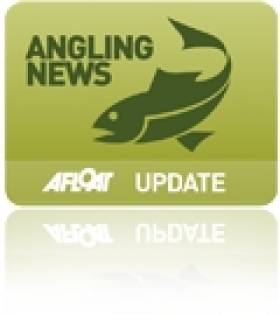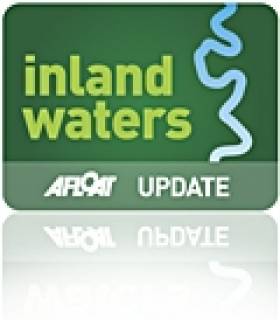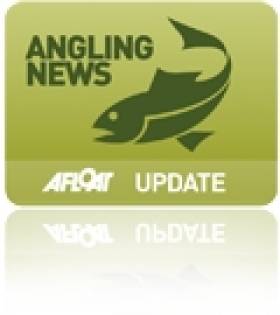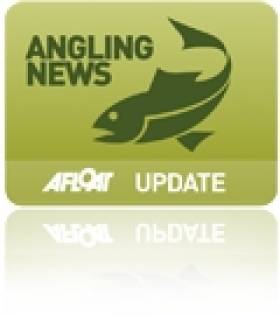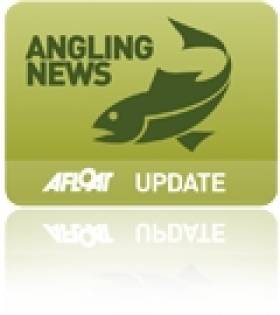Displaying items by tag: perch
Five Men Convicted for Fishing Offences in County Monaghan
At a sitting of Castleblaney District Court on 10th February 2016, Judge Denis McLoughlin convicted five men for coarse and pike fishing offences at lakes in Castleblaney, Co. Monaghan. Fines issued totalled €1,250 and costs were awarded to Inland Fisheries Ireland to the amount of €5,320.
Mr. Rimantus Janusonis was fishing at Lough Muckno in Castleblaney, Co. Monaghan, on 1st May 2015. He was found to be fishing with three rods, exceeding the legal limit which stipulates that a person may not fish with more than two rods at a time, and was apprehended by Inland Fisheries Ireland Officer Ronan O’Brien. Mr. Artur Moisjenkov was fishing at Drumgristin Lake in Co. Monaghan on 14th June 2015 and was acting suspiciously. Officer Ronan O’Brien found six coarse fish in Mr. Moisjenkov’s possession, one of them measuring 30 centimetres in length.
On 4th July 2015, at Drumillard Lake, Co. Monaghan, Mr. Gazda Henryk and Mr. Jan Pieczykolan were found to have pike and bream over the legal size limits in their possession by two private waterkeepers from Castleblaney Anglers Club. Mr. Henryk and Mr. Pieczykolan were subsequently apprehended by Inland Fisheries Ireland Officer Dermot Wynne for having fish over the legal size limit.
On 25th July 2015, an individual was detected by private waterkeepers at Concra Wood in Lough Muckno, Co. Monaghan. Mr. Andrei Ion Ursache was found to have 22 perch in his possession with three over the size limit of 25 centimetres. He was apprehended by Inland Fisheries Ireland Officer Seamus Kelledy for exceeding the limit of four coarse fish in his possession.
None of the defendants were present at a sitting of Castleblaney District Court on 10th February 2016. The cases had been adjourned a number of times, following the reissuing of summons. Judge McLoughlin convicted the individuals as follows:
· Mr. Rimantus Janusonis, Drogheda, Co. Louth, for breach of Byelaw no. 595 of 1977, which states that a person may fish with not more than two rods at any time.
· Mr. Gazda Henryk, Dundalk, Co. Louth, was convicted for breach of the pike Byelaw no. 809 of 2006, which states that it is prohibited to kill any pike greater than 50 centimetres in length.
· Mr. Andrei Ion Ursache, Drogheda, Co. Louth; Mr. Artur Moisjenkov, Drogheda, Co. Louth; and Mr. Jan Pieczykolan, Dundalk, Co. Louth were convicted for breaches of the coarse fish Byelaw no. 806 of 2006, for taking and killing more than four coarse fish per day.
Judge McLoughlin fined each defendant €250 and ordered the payment of €1,064 each of total costs to Inland Fisheries Ireland to be paid within four months.
Mr. Brian Beckett, Director of Inland Fisheries Ireland Dublin, said: “I would like express IFI’s appreciation for the assistance of two waterkeepers Mr. Patrick McArdle and Mr. Micky O’Connor, who detected and followed up on some of these incidents with IFI staff in the Dundalk District. This serves as a great example of the vigilance, commitment and team work in operation between Inland Fisheries Ireland and private waterkeepers in protecting and conserving our valuable fisheries resource.”
Dr Ciaran Byrne, CEO of Inland Fisheries Ireland, noted: “Lough Muckno, Drumgristin and Drumillard Lake, along with many others, make Castleblaney in Co. Monaghan the jewel in the crown for pike and coarse fishing in Ireland’s North East. They provide an important recreational amenity to both local and overseas anglers as well as important match fishing venues.
“Angling generates over €830 million to the Irish economy every year and illegal activity and environmental crime jeopardises the potential of our wonderful natural resource to sustain stocks and the social and economic benefits derived from them.”
Inland Fisheries Ireland (IFI) has a confidential hotline number to enable members of the general public to report incidents - 1890 34 74 24 or 1890 FISH 24. This phone line is designed to encourage the reporting of incidents of illegal fishing, water pollution and invasive species.
#Angling - The World Youth Fly Fishing Championship is coming to Ireland's border region next month.
And as the Carrick Times reports, Carrickfergus in Co Antrim is looking forward to hosting part of the event at the Woodford Fly Fishery.
What's more, local lad and Woodford member Darren Crawford will be among the all-Ireland fly fishing squad vying for the international title at the event, co-sponsored by the Loughs Agency and Inland Fisheries Ireland.
Rivers and lakes hosting the competition are spread over the counties of Antrim, Louth, Monaghan, Meath and Tyrone.
In other inland fisheries news, Galway Bay FM reports that testing carried out after a fish kill in Loughrea Lake last month found no evidence of any bacterial or viral outbreak.
The cause of the incident that killed 100 perch in the lake are still unclear, though stresses connected with the spawning season are a distinct possibility.
Loughrea Lake Fish Kill Investigated
#FishKill - Galway Bay FM reports on an investigation into a fish kill discovered in Loughrea Lake yesterday 12 May.
Inland Fisheries Ireland staff have attended the scene after being alerted by the public, discovering some 100 dead perch in the water.
However, it is believed the fish died as a result of a natural phenomenon, as no dead fish of any other species was found.
Such mortalities in the wake of the perch spawning season are not uncommon due to the stresses it puts on the fish, leaving them susceptible to infection.
#Angling - Inland Fisheries Ireland (IFI) has successfully prosecuted two men for taking more than the legal amount of coarse fish on Lough Derg.
Roman and Vytas Maslauskas, brothers originally from Lithuania but living in Ireland for the last eight years, appeared before Killaloe District Court where they were fined €500 each and were also disqualified from holding a driving licence for a period of six months. Both men have two weeks within which to lodge an appeal.
Last year IFI fisheries officers carried out a surveillance operation on the basis of reports received from both the public and local anglers on Lough Derg. The Maslauskas brothers, who were fishing mainly for perch from a boat, were doing so in manner that did not appear to be for recreational purposes. The anglers were capturing large numbers of fish using rod and line but had the aid of a fish finder on board the boat also.
The two men were apprehended at the lower end of the lake at the slipway in Ballina. Their boat and a large quantity of fishing equipment were seized during the capture. Some 32 perch were also seized, of which eight were over the 25cm size limit for coarse fish. Two vans were used in the operation for transporting the fish and equipment.
In his comments at the end of the case, Judge John Durkan said: “Our inland waters are of the most valuable in Europe and need to be well protected”.
He added that those who abuse them must face serious consequences.
“Protecting our fisheries is never an easy task,” said Minister Fergus O’Dowd, minister with responsibility for inland fisheries, at the outcome of the prosecution. “I commend the work of the Inland Fisheries Ireland staff, the Gardaí and of course the anglers and members of the public who made this prosecution possible.
“Working together you have helped the environment and the potential of Lough Derg to generate a better return economically and socially to the local community.”
IFI describes Lough Derg as “a mixed fishery which holds good stocks of coarse, pike and trout” and “a valuable natural asset to the local economy as it attracts both national and international anglers and visitors”.
IFI Limerick director Amanda Mooney commented that the ruling “sends out a strong message that our wild fish populations must be protected. IFI have invested in multi-lingual angling guides which detail and explain coarse fish by-laws. There is no longer an excuse of not knowing what rules apply.”
Hooked Live! Returns to CityWest This Weekend
#ANGLING - Hooked Live!, Ireland’s premier angling and fishing show, is returning to the CityWest Hotel and Lakes this weekend 10-11 March for the third year running.
Spey caster and innovator Ian Gordon is the latest star to join the already confirmed visitor favorites Paul Young, Henry Gilbey, Scott MacKenzie, Andrew Ryan and AGPAI Ireland, who will bring world-class casting demonstrations, talks and personal one-to-one sessions designed to improve and empower visitors to become better anglers.
Bringing the best in Irish angling water sports, with new tackle, venues and angling techniques, Hooked Live! also caters for the fly-fishing enthusiast with fly-tying and casting lessons.
And that's not to mention fly-fishing on our fully stocked lake, where both trout and perch will readily take a fly. Indeed, there are many top prizes to be won in the Lakes Fishing Challenge.
Sea anglers are also catered for and welcome at Hooked Live! and for the coarse fisher, there will be top class exhibits with great tackle and equipment available and a range of venues which will produce results.
Popular seminars will also cover some of the new and successful tackle and techniques which are now being used to catch more fish.
Also returning to Hooked Live! will be the Sporting Gun Show. Taking advantage of the synergy between shooting and fishing, visitors will be able to pick up bargains on end-of-shooting-season stock.
Tickets for Hooked Live! 2012 are priced from just €10 and are available now from tickets.ie. For more details visit the official website at www.hooked.ie
Carlow Angler Spearheads Coarse Fishing Revival
#ANGLING - Tuesday's Enniscorthy Guardian writes about the revival of coarse fishing in Ireland, spearheaded by Gerry McStraw, chairman of Carlow Coarse Angling Club.
McStraw runs a tackle and bait business in Graiguecullen on the River Barrow, which has made a comeback after years of heavy poaching, and become a safe environment for families to enjoy.
Bream, hybrids, roach, dace and perch are now in abundance in the river - with bag weights of up to 50 lb of roach possible - while the pike pose a worthy challenge for the determined angler.
Carlow Sports Partnership will award a special bursary to the club on Wednesday 30 November in recognition of its work not only in protecting the river but also in youth development.
The Enniscorthy Guardian has more on the story HERE.



























